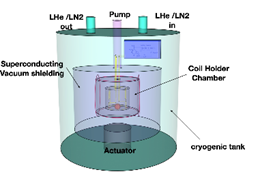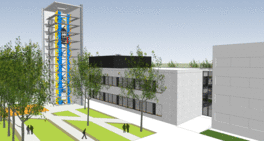Research Projects
-
Multifunctional Measurement System for Microgravity ResearchThe aim of this research project is to develop a sensor system for research in weightlessness. The system should be able to record and process relevant data.Led by: M. Sc. Richard SperlingYear: 2024Funding: Ministry of Science and Culture of Lower Saxony (MWK)Duration: 01.01.2024 - 30.06.2024
![]()
![]()
-
Development of a multi-user facility for quantum experiments in the Einstein-Elevator by integrating an ISS express rackThe project aims to develop a multi-user express rack that serves as an interface between the Einstein-Elevator and the scientific experiments on the ISS and is based on the standardized sizes of the International Standard Payload Rack (ISPR). Technical specifications such as power supply, communication systems, and cooling must be adapted to the special environmental conditions of the Einstein-Elevator to support and validate current and future ISS research projects efficiently.Led by: M. Sc. Marvin RaupertYear: 2024Funding: QuantumFrontiersDuration: 01.07.2024 - 31.12.2024
![]()
![]()
-
Microgravity Assembly for Acceleration TestingThe aim of this research project is to develop a module that records and evaluates microgravity data within an Orbital Paradigm orbiter. The orbiter is to be used within low Earth orbit.Led by: M. Sc. Richard SperlingYear: 2024Duration: 01.06.2024 - 31.12.2026
![]()
![]()
-
Ultrasonic levitation as a handling tool for ISM processesThe joint project Lev4ISM pursues the development of an innovative, resource-saving manufacturing process for In-Space Manufacturing (ISM), which aims to enable the substrate-free production of components in microgravity. By using acoustic levitation and implementing coupled simulations, the precise handling of particles and components in microgravity will be researched to create long-term solutions for sustainable and flexible space missions.Led by: M. Sc. Jan RaffelYear: 2023Funding: German Aerospace Center (DLR)Duration: 01.09.2023 - 31.08.2025
![]()
![]()
-
Levitated Magnets for Quantum MetrologyThis project aims at a systematic investigation of sensors based on levitated micromagnets, which allow to measure ultra-low torques and magnetic fields, demonstrating an unprecedented energy resolution.Led by: M. Sc. Alexander HeidtYear: 2022Funding: QuantERA Project of the EU (DFG)Duration: 01.01.2022 - 31.12.2024
![]()
![]()
-
Activity of comets under partial gravityCometary activity, which in this case refers to the ejection of dust from the surface, can be simulated in the laboratory, but more than a thousand times Earth's gravity overrides the gravity prevailing on comets. With the help of the Einstein-Elevator it will be possible to perform experiments under comet-like conditions.Led by: M. Sc. Emre TahtaliYear: 2022Funding: German Aerospace Center (DLR)Duration: 01.08.2022 - 31.07.2025
![]()
![]()
-
Hannover Center for Microgravity ResearchThe focus of the DFG-funded research center "Hannover Center for Microgravity Research" is the establishment of an administrative service and management structure for the Einstein-Elevator. This should enable effective use of the Einstein-Elevator, also for external scientists.Led by: Dr.-Ing. Christoph LotzYear: 2022Funding: DFGDuration: 01.01.2022 - 31.12.2024
-
Laser-based additive manufacturing of metal parts from powder in microgravityThe aim of this research project is the development of a laser-based additive manufacturing process for the production of metal parts from powder in microgravity. The approach is based on the "Laser Metal Deposition" (LMD) process known for earth gravity.Led by: M. Sc. Marvin RaupertYear: 2021Funding: DFGDuration: 07.2021 - 06.2024
![]()
![]()
-
Dark Energy Search with Atom Interferometry in the Einstein-ElevatorThe collaboration DESIRE uses the free-fall simulator Einstein-Elevator for dark energy search with atom interferometry. For this purpose the apparatus MAIUS-A will be reconstructed with a specialized test mass and afterwards operated in microgravity.Led by: M. Sc. Alexander HeidtYear: 2021Funding: German Aerospace Center (DLR)Duration: 01.04.2021 - 31.03.2024
-
Interferometry with entangled atoms in spaceIn this project, the entanglement of atoms in microgravity is measured using a robust and compact atomic sensor. The main goal is to demonstrate interferometric sensitivity beyond the standard quantum limit in microgravity.Led by: M. Sc. Alexander HeidtYear: 2021Funding: German Aerospace Center (DLR)Duration: 01.09.2021 - 31.12.2024
-
Experiment carrier for the Einstein-ElevatorAn essential Component of the Einstein Elevator at the Hannover Institute of Technology (HITec) is an experiment carrier, that is used inside the Einstein Elevators gondola. In collaboration with the German Aerospace Center (DLR), the Institute for Transport and Automation Technology is developing a low-vibration carrier. The aim is to use the system to carry out various experiments under microgravity.Led by: M. Sc. Richard SperlingYear: 2020Funding: DLR-SIDuration: 08.2020-07.2023
![]()
![]()
-
Cold Plasma in ZeroGThe height dependence of the plasma conditions and the height dependence of the dynamics of charged microparticles inserted into the plasma are to be investigated in the Einstein-Elevator in a plasma chamber. To this end, the movements of the microparticles during the transition from 1 g to 0 g in the Einstein-Elevator are to be analyzed.Led by: Dr.-Ing. Christoph LotzYear: 2019Funding: German Aerospace Center (DLR)
![]()
![]()
-
Setup of an active drop towerAs part of the establishment of the Hannover Institute of Technology (HITec), an active drop tower, the Einstein-Elevator is being set up by the Institute of Transport and Automation Technology (ITA). The design, development and construction of the facility are being carried out in collaboration with the QUEST Leibniz Research School (QUEST-LFS) and the Institute of Quantum Optics (IQ). The aim is to be able to carry out experiments under conditions of microgravity, but also under different partial gravity conditions such as those on the Moon or Mars.Led by: Dipl.-Ing. Christoph LotzYear: 2011Funding: German Research Foundation (DFG) and Lower Saxony state gouvernmentDuration: since 10/2011
![]()
![]()






































